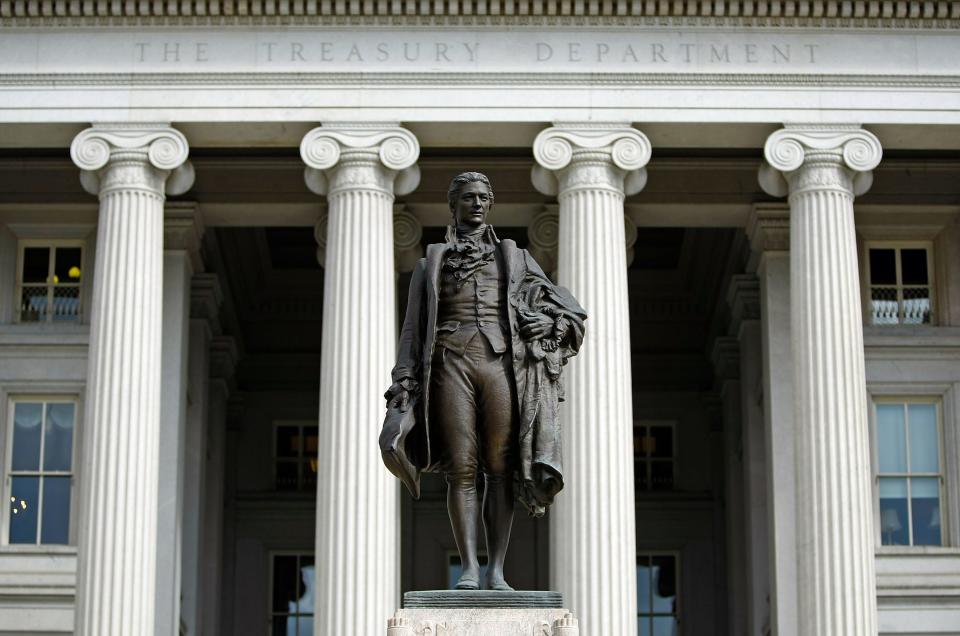Record-high national debt is fiscal time bomb for US. Congress must defuse it.
- Oops!Something went wrong.Please try again later.
In the late 1780s, the finances of the United States were in disarray. Revolutionary War debts incurred by the Continental Congress and former colonies were defaulting, and the democratic experiment in the New World was on the brink of failure. But the nation caught a break when President George Washington appointed Alexander Hamilton as the first secretary of the Treasury.
In 1790 and 1791, Hamilton persuaded a reluctant Congress to establish the nation’s first central bank and consolidate all outstanding state and federal debt. The federal debt burden after this action was just 30% of gross domestic product. A few years later, President Washington reinforced in his farewell address the need to avoid excessive debt.
Over the next 175 years, politicians across the political spectrum largely adhered to Hamiltonian principles to preserve the integrity of the public credit. The most important principle was that debt should be issued primarily to address emergencies – especially those involving foreign wars – and that debt burdens should be reduced during times of peace.
This discipline enabled America to establish and maintain its excellent credit record, which provided ample lending capacity during periodic crises. As Hamilton predicted, the ability of the nation to borrow proved critical during the War of 1812, the Civil War, World War I and World War II.

After the first three wars, the United States restored fiscal discipline, had surpluses in many years and reduced the debt burden. After World War II, fiscal discipline was temporarily restored, and debt/GDP was reduced by growing the economy much faster than the debt even though the federal government continued to run budget deficits during most years.
The one exception was in 1998-2001, when the federal government ran budget surpluses and even paid down debt in two of these years.
National debt is now 123% of gross domestic product
Since then, the Hamiltonian principle has been decisively abandoned, and the federal government now routinely runs large deficits, resulting in ever-increasing debt burdens. This behavior is projected to worsen in the future.
Mounting federal debt burdens now represent the greatest threat to the U.S. economy, national security and social stability. The federal debt/GDP ratio is 123%. The nonpartisan Congressional Budget Office projects that, under current law, it will increase to 192% by 2053.
Clearly this is irresponsible, unsustainable and in sharp contrast to Hamilton’s founding principle.
National debt has topped $34 trillion. Does anyone actually have the guts to fix it?
Why does the United States continue to behave so irresponsibly?
One reason is that U.S. politicians routinely avoid spending cuts and tax increases because they may threaten their reelection prospects.
Another is that, as the issuer of the world’s dominant reserve currency, the United States can run fiscal deficits so long as surplus countries, such as China and Saudi Arabia, continue to purchase U.S. Treasuries. In fact, proponents of the flawed and failed Modern Monetary Theory implicitly argue that the dollar’s reserve currency status is permanent, which allows deficit spending to continue indefinitely.
Advocates of this theory naively assume that the U.S. dollar will serve as a dominant reserve currency permanently; they conveniently ignore the past fate of the British pound sterling and the Dutch guilder.
Opinion alerts: Get columns from your favorite columnists + expert analysis on top issues, delivered straight to your device through the USA TODAY app. Don't have the app? Download it for free from your app store.
Congress must defuse America's fiscal time bomb
A debt crisis is not imminent in 2024, but one will occur in the future if the nation’s addiction to deficits and debt persists. The greatest risk is the one that Alexander Hamilton feared most: One day, the United States could face a threat to its very existence – perhaps in the form of a foreign war – and Americans will lack the debt capacity to fund an adequate response.
Fortunately, the future is far from hopeless. America sits on a huge reservoir of natural resources and remains the world’s technological innovation engine. It also possesses sufficient time to enact fiscal reforms and reestablish fiscal discipline.
The challenge for Americans today is that the longer we wait to reinstate this principle, the more pain that will be incurred. It is our belief that the solution is in the hands of "We the People."
The math doesn't lie. Republicans and Democrats own every missing dollar of our growing national debt crisis.
Politicians have powerful incentives to respond to short-term demands, and if Americans collectively demand that short-term desires must be satisfied at the expense of the nation’s long-term prosperity and solvency, that is what politicians will deliver.
On the other hand, if Americans place equal value on the longevity of their country and the prosperity of their children and grandchildren, they will demand that politicians take steps to defuse America’s fiscal time bomb.
History suggests that Americans will eventually pursue the correct course of action. Our hope is that they embrace it quickly to ensure that America's future is brighter than its past.
David M. Walker, a former U.S. comptroller general, is also a recipient of the Alexander Hamilton Award for economic and fiscal policy leadership from the Center for the Study of the Presidency and the Congress. Mark J. Higgins is author of "Investing in U.S. Financial History: Understanding the Past to Forecast the Future," coming Feb. 27. Connect with Mark on LinkedIn.
You can read diverse opinions from our Board of Contributors and other writers on the Opinion front page, on Twitter @usatodayopinion and in our daily Opinion newsletter.
This article originally appeared on USA TODAY: US debt is threat to economy and national security. It's irresponsible

